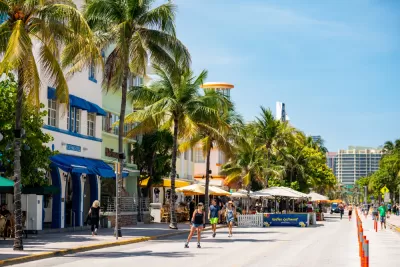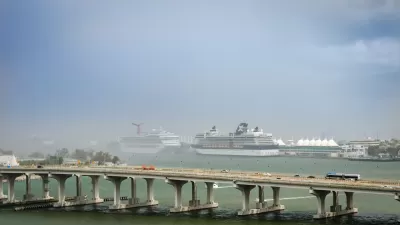Mayor Francis Suarez thinks the tunnel could alleviate congestion, but critics argue the city's rising water table makes tunneling too expensive and impractical.

Despite the city's reputation as a "sinkhole capital," Miami Mayor Francis Suarez plans to "seek federal funding for an Elon Musk-built underground car tunnel to curb traffic," reports Denise Pellegrini in Bloomberg Quint. Ignoring longstanding concerns about the high water table in the area, "Suarez has become the chief local advocate" for the tunnel and hopes that the federal government will "involve itself" in the project. Although the roads are controlled by the county rather than the city, the mayor hopes his enthusiasm will lead to more momentum for the tunnel.
"After meeting with executives from Boring, who are already building a tunnel for self-driving Teslas in Las Vegas, Suarez said he is thinking about a similar transportation system that could potentially connect Brickell to downtown, Grand Central Station, Miami World Center, the Omni area, Wynwood, and Little Haiti." Anticipating a funding shortfall, "Suarez is also already pursuing a company-funded model for the project," writes Pellegrini. "Suarez thinks Musk may agree to build a user-fee based tunnel system in Miami, and says such systems could become widely popular across the country." While the mayor points to a "Boring project in Chicago [that] is set up under a similar concept," that project has been almost certainly scrapped.
FULL STORY: Miami Mayor to Seek Federal Funding for Proposed Elon Musk Tunnel

Study: Maui’s Plan to Convert Vacation Rentals to Long-Term Housing Could Cause Nearly $1 Billion Economic Loss
The plan would reduce visitor accommodation by 25,% resulting in 1,900 jobs lost.

North Texas Transit Leaders Tout Benefits of TOD for Growing Region
At a summit focused on transit-oriented development, policymakers discussed how North Texas’ expanded light rail system can serve as a tool for economic growth.

Why Should We Subsidize Public Transportation?
Many public transit agencies face financial stress due to rising costs, declining fare revenue, and declining subsidies. Transit advocates must provide a strong business case for increasing public transit funding.

How to Make US Trains Faster
Changes to boarding platforms and a switch to electric trains could improve U.S. passenger rail service without the added cost of high-speed rail.

Columbia’s Revitalized ‘Loop’ Is a Hub for Local Entrepreneurs
A focus on small businesses is helping a commercial corridor in Columbia, Missouri thrive.

Invasive Insect Threatens Minnesota’s Ash Forests
The Emerald Ash Borer is a rapidly spreading invasive pest threatening Minnesota’s ash trees, and homeowners are encouraged to plant diverse replacement species, avoid moving ash firewood, and monitor for signs of infestation.
Urban Design for Planners 1: Software Tools
This six-course series explores essential urban design concepts using open source software and equips planners with the tools they need to participate fully in the urban design process.
Planning for Universal Design
Learn the tools for implementing Universal Design in planning regulations.
Ascent Environmental
Borough of Carlisle
Institute for Housing and Urban Development Studies (IHS)
City of Grandview
Harvard GSD Executive Education
Toledo-Lucas County Plan Commissions
Salt Lake City
NYU Wagner Graduate School of Public Service




























